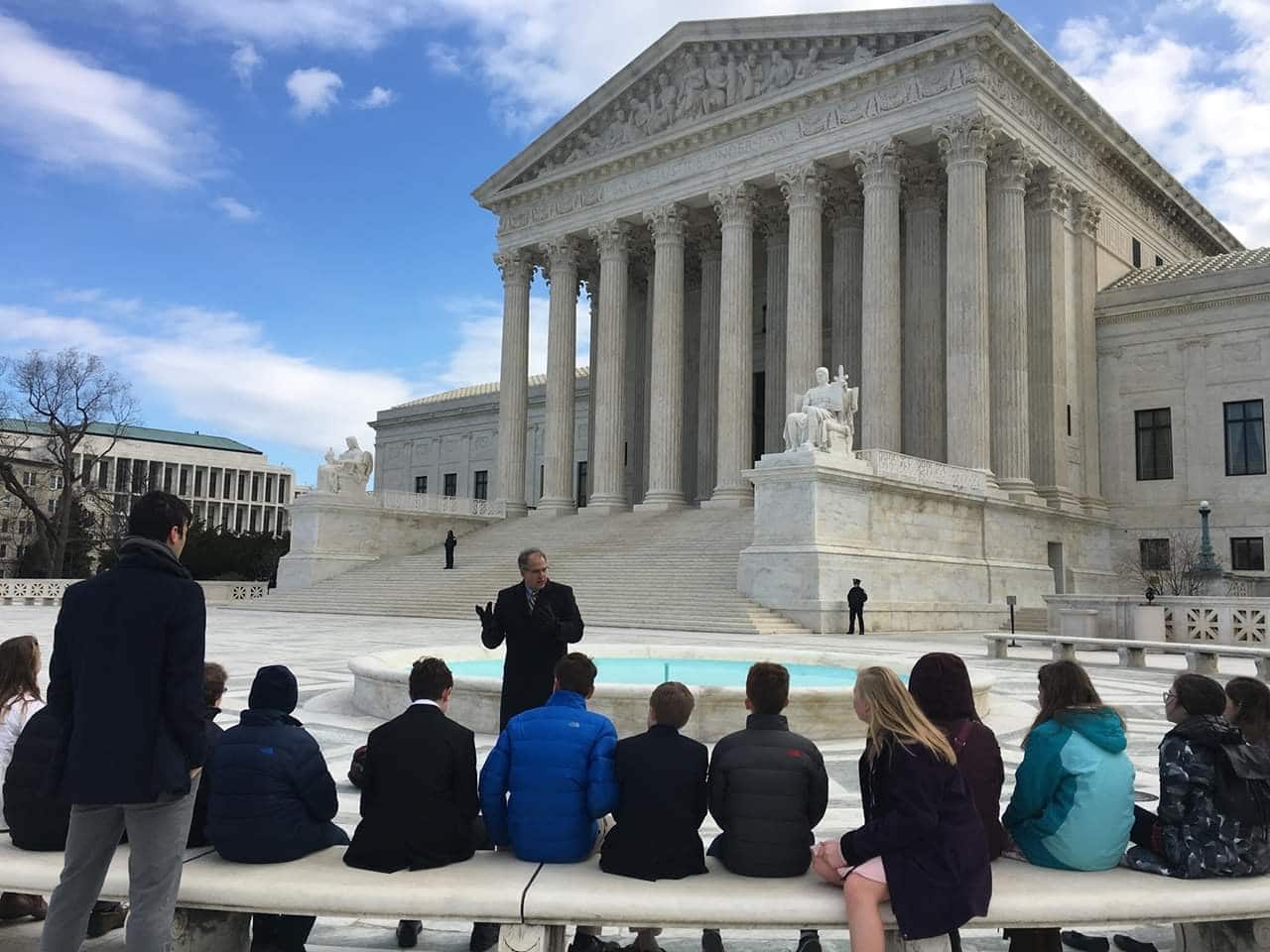Talking politics with our teens is no doubt a daunting task and one that most of us would probably like to take a pass on! Here are 7 ideas to help your teens formulate their views on politics.
We live in a very politicized time.
There is no question about it: we live in a very politicized time. Our country feels so deeply divided, with our government literally ground to an unprecedented halt by tensions and divisions and the inability to find cooperative ways forward.
Our mailboxes have barely had time to empty from the barrage of mid-term election solicitations. With the announcements of candidates entering the field, the 2020 presidential race is now seemingly already upon us. Terse, frustration-filled political headlines flood the media around us.
Sure, some of us put our blinders on and choose to focus on the non-political cares of our days. (I’m pretty sure this comes somewhat naturally to many moms as we have more than enough on our plates to keep us infinitely distracted!) But what about our teens, or up-and-coming teens?
Are today's teens tuning out the political noise?
Are today’s teens tuning out the political noise? I’m guessing that might be true for some, but curiosity certainly marks the adolescent mind, and I think many of our children, pre-teen and up, are dialing in and trying to make sense of the messages they are hearing and how these messages inform their world and their beliefs about it.
Politics shouldn’t have to be a dirty word!
I’d advocate that it would be prudent of us as parents to embrace this as an opportunity to use our influence to help our children learn how to navigate politics in an informed and conscientious way. After all, politics shouldn’t have to be a dirty word! Much of the change that we have witnessed and valued in our country and world, throughout the centuries, has been brought about through political avenues. At its best, politics can be a powerful agent for good.
So how can we raise teens who feel empowered to become a healthy part of this process? To be informed, voting citizens giving voice and drive to ideas for desired change, becoming, perhaps, dare we say, the leaders who will represent and draft policy for us and future generations?
STARTING THE political CONVERSATION with your pre-teen
1. Take a deep breath!
Yes, it is true that we are living in what has come to be painted as a society deeply divided by fear, anger, frustration, and resentment, but we don’t need to bring this spirit into our living rooms and to our dinner tables! Taking a deep breath first can make sure we’re in the right frame of mind ourselves to lead a productive conversation.
2. Model the behavior you would LIKE to see from our representatives and leaders!
It is certainly okay, perhaps even noble, to have deeply-held convictions and ideas and be able to defend them in a winsome way. But model how to talk about them, pointing out specifically what you believe and why, without unnecessarily attacking people who hold differing political convictions. Civility should be what we strive for every time we engage in a conversation about politics.
3. Invite conversation about what true leadership looks like
Talk to teens about the values they would like to see in the leaders that represent and lead us. Are the same qualities needed for political leadership compared to leadership in other areas such as business, family, or the church? Why or why not?
4. Acknowledge the complexity where it exists!
Few things are black-and-white or have easy, clear-cut answers. The problems our country faces are often deep-seated, frequently stemming from competing (but perhaps equally legitimate) interests from very different populations with their own unique fears and frustrations, hopes and dreams. Again, invite your teens into thougthtful discussion. Ask them
- What do you see as some of the pressing issues of our time?
- What are some of the different sides in these issues, and what do you think might be driving some of these different feelings and opinions?
- What ideas do you have for solutions?
- How do we come to solutions when our needs and convictions are sometimes so different?
5. Guide teens to be wise consumers of headlines and news media
Help teens understand that news sources often come from a particular political leaning of various degrees, as well as varying objectives (ie reporting facts vs. making interpretations or analysis), all of which can be useful, but it is important to understand the intent. Help teens understand that every source of news and news-opinion (including the people who repeat and discuss news headlines…ahem, most of us!) essentially creates a lens through which we are seeing and interpreting the world.
Consider using a visual, such as a media bias matrix like this one found on Pew Research Center’s website, to help teens understand the concept of bias in media.
Together with your teen, explore an issue from news sources representing different ends of the spectrums. Ask them to share their observations.
- If your teen has a favorite news source, particularly if it is of a different leaning than your own preference, take the time to listen or read with your child. Seek to understand what they are connecting with, not just to refute or challenge their ideas.
- Invite your teen to do the same with the news sources you trust. Share what you value about these sources, and allow your teen the opportunity to share their observations about your preferred news sources.
6. Have an honest conversation about how politics, faith, and religion intersect
Share with your teen how your own faith informs your political values and views. These questions might be good conversation starters:
- How do different religious viewpoints inform and guide our country? Other countries?
- What value does bringing faith into public politics add? What are some of the challenges?
- How can our faith bring out the best in politics, and how might politics bring out the best in our faith?
- What does the Bible teach about the intersection of our faith and our experience and participation in earthly governments?
7. Remind your teens that politics (i.e. Public policy) is but one means for change!
Diffuse potential discouragement and disillusionment by encouraging teens to find other avenues to bring about the change they would like to see in the world. Ideas include gathering and donating supplies to a teen pregnancy center, serving at a local homeless shelter, or organizing efforts to help a school or community learn about creation care and find meaningful ways to participate in caring for the environment.
TAKING THE LONG VIEW on talking to your teens about politics
Remain encouraged, calm, and engaged as your teens begin to explore the messy world of politics and different approaches to the many critical issues of our time. Our role as parents is to be a guide, helping our teens develop the tools to evaluate issues and construct their own values-informed opinions. As they learn to eloquently articulate, negotiate, and defend their ideas, confidently and constructively engaging with a public full of many different viewpoints, they will become agents for powerful and positive change as the influencers, leaders and voices of tomorrow.
{{cta(‘13402357-7472-4e29-b7d3-e218cde05113’)}}
{{cta(‘741bf208-005a-45e1-be5c-46a252b1286c’)}}






